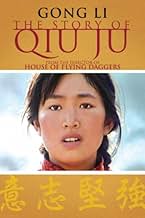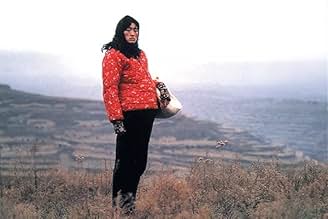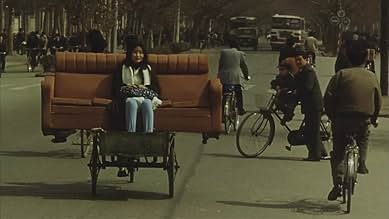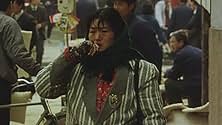IMDb-BEWERTUNG
7,5/10
7033
IHRE BEWERTUNG
Eine Bäuerin sucht Gerechtigkeit, nachdem der Vorsteher ihres Dorfes ihren Mann in den Unterleib getreten hat.Eine Bäuerin sucht Gerechtigkeit, nachdem der Vorsteher ihres Dorfes ihren Mann in den Unterleib getreten hat.Eine Bäuerin sucht Gerechtigkeit, nachdem der Vorsteher ihres Dorfes ihren Mann in den Unterleib getreten hat.
- Auszeichnungen
- 19 Gewinne & 9 Nominierungen insgesamt
Empfohlene Bewertungen
Gong Li, China's top actress in the 1990s (deservedly so), plays a naive but determined innocent, a young married woman from a remote farming village who wants nothing more than to have the village elder apologize to her husband for kicking him in a fit of anger. The bureaucratic nightmare she endures, making repeated trips to "the city" to seek justice, exposes her to a system she didn't know existed, a completely convoluted and impregnable one that operates solely by standards and practices, totally devoid of compassion or an understanding of the people it governs.
This is a small film, an earlier work by master Chinese filmmaker Zhang Yimou (To Live, Ju Dou), but what really makes it work is Gong as Qiu Ju. Every effect of this effectless society registers on her face, mostly in the form of surprise at the promises unkept and disappointment at the lack of concern by officials who are supposed to be responsible to "the people." She makes us care deeply about Qiu Ju, even though we may not be able to identify directly with her circumstances, but even beyond this, she makes these provincial circumstances universal by being the everywoman, someone who just wants the people in charge to do what's right without it necessarily having any adverse impact on themselves. Gong's ability to inject political situations with sincere human emotion has made her an ideal representative of the message running through all of Zhang's films (she has appeared in several of them), but beyond this, she simply is a great actress who should eventually become as world renowned as Joan Chen once was.
What makes this film even more prescient is how well many Americans may identify with the nightmares presented by a government hierarchy overstuffed with "I just work here" bureaucrats. And the ending is infused with a poignant irony that will hit home with anyone who has, in their own lives, found that time heals all wounds.
This is a small film, an earlier work by master Chinese filmmaker Zhang Yimou (To Live, Ju Dou), but what really makes it work is Gong as Qiu Ju. Every effect of this effectless society registers on her face, mostly in the form of surprise at the promises unkept and disappointment at the lack of concern by officials who are supposed to be responsible to "the people." She makes us care deeply about Qiu Ju, even though we may not be able to identify directly with her circumstances, but even beyond this, she makes these provincial circumstances universal by being the everywoman, someone who just wants the people in charge to do what's right without it necessarily having any adverse impact on themselves. Gong's ability to inject political situations with sincere human emotion has made her an ideal representative of the message running through all of Zhang's films (she has appeared in several of them), but beyond this, she simply is a great actress who should eventually become as world renowned as Joan Chen once was.
What makes this film even more prescient is how well many Americans may identify with the nightmares presented by a government hierarchy overstuffed with "I just work here" bureaucrats. And the ending is infused with a poignant irony that will hit home with anyone who has, in their own lives, found that time heals all wounds.
Zhang Yimou's "The Story of Qiu Ju" is not a masterpiece as is his film "Raise the Red Lantern." It doesn't have the epic qualities of "To Live" nor is it as visually stunning as "The Road Home." But "Qiu Ju" may well be Yimou's most thought provoking film, leaving you pondering the messages a long time after the film has ended.
Qiu Ju's husband has been kicked ("where it counts") by the village chief. The only bit of justice Qiu Ju wants is an apology. It seems to be a simple enough request, but her search for the apology proves to be elusive as she encounters a legal system more interested in its own red tape than in the needs of ordinary people.
But this is not "Erin Brockovich" where the sides of "good" and "bad" are easily defined. The people in the legal system Qiu Ju encounters are genuinely decent folks. They are also, unfortunately, a bit clueless. And Qiu Ju is not beyond reproach herself. At the conclusion of the film even she is realizing that she has pushed the matter too far.
Just how far should one go to seek justice in this world? Even if you are totally in the right, does there come a time when you must let the matter rest for your own sake as well as everybody else's? There are no easy answers.
This is another great performance by Gong Li in the title role. She may be one of the most beautiful women in the world, but here she is not above playing "dowdy." And as usual, Zhang Yimou is nearly flawless in his direction. He gives a wonderful tip of the hat to the late French director Francois Truffaut in the end, echoing that famous final shot of Truffaut's "The 400 Blows."
But this is a film that will stick with you well past that last shot.
Qiu Ju's husband has been kicked ("where it counts") by the village chief. The only bit of justice Qiu Ju wants is an apology. It seems to be a simple enough request, but her search for the apology proves to be elusive as she encounters a legal system more interested in its own red tape than in the needs of ordinary people.
But this is not "Erin Brockovich" where the sides of "good" and "bad" are easily defined. The people in the legal system Qiu Ju encounters are genuinely decent folks. They are also, unfortunately, a bit clueless. And Qiu Ju is not beyond reproach herself. At the conclusion of the film even she is realizing that she has pushed the matter too far.
Just how far should one go to seek justice in this world? Even if you are totally in the right, does there come a time when you must let the matter rest for your own sake as well as everybody else's? There are no easy answers.
This is another great performance by Gong Li in the title role. She may be one of the most beautiful women in the world, but here she is not above playing "dowdy." And as usual, Zhang Yimou is nearly flawless in his direction. He gives a wonderful tip of the hat to the late French director Francois Truffaut in the end, echoing that famous final shot of Truffaut's "The 400 Blows."
But this is a film that will stick with you well past that last shot.
When her husband insults a neighbor and is nearly 'emasculated', a peasant woman goes to great lengths to secure justice. Many people in the West may not understand why this woman is so determined to right such a 'minor' wrong. In Chinese culture, an assault on another man's "honor" is not viewed as a 'minor' thing; having children is very important and carries a greater social significance than it does in the West. It is expected of every man, and having a son, especially, to work in the fields for the good of the family and carry on the family name, has been worshipped as a Confucian ethic for centuries. China is still very much a paternalistic society (despite Communist reform),and the 'one child' policy has only reinforced the old Chinese adage that "if you bear a girl,bear a beautiful one, if you bear a son, bear an intelligent one." So understandably,from the viewpoint of Qiu Ju,not only does her husband suffer but her entire family name and honor suffers too, when the man is attacked in a 'sacred place', his gonads. The village chief, the fellow who delivered the disabling kick,has also been dishonored by the husband's insult about "having hens" and not boys. By kicking the offending man in the balls, the village chief wanted to save his face, hence the stalemate. But for Qiu Ju, and certainly in Chinese eyes, the greater wrong is the assault on her husband's reproductive organs. A delightful movie, so well acted with quite a few funny moments surrounding a serious issue. Zhang Yimou is one fine director.
10jtur88
I've visited rural China, and this is the most realistic film I have ever seen. I was awestruck at how well this film captures exactly the China that a modern visitor to the country would see. Not just the landscapes---the people are portrayed just as they are. I carry a copy of this film with me to show my friends and family--I know of no better way to illustrate the China that I actually saw. In addition, as a film-goer, I loved this film for its austere simplicity of production. I found myself wondering how many of the people who appeared on the screen were actually actors---as opposed to just having a candid camera imposing itself into their daily lives. I loved the scene in the office where an official was issuing a marriage license to a young couple---this was a spine-tinglingly poignant scene that, to me, underscored the genuine humanity that would seem so impossible in such a country---a humanity that is real. The Chinese are lovely, gentle people, and it was a delight to see a film that accurately reflects this character.
Most Chinese movies are about victims of the culture or political system or how beautiful you men and women are kept apart or forced together by forces outside their control. This movie is completely different. It is a simple story about the ordinary Chinese people you can meet on the street and in their homes today and their ordinary lives. It is an amazingly accurate portrayal, unlike anything I have seen before. I only spent 3 weeks in China, but this movie brought back the feel of China, its people, and organizations.
Qxi Ju wants an apology from the Chief of the commune for kicking her husband in the groin. This is a story about her travels from the commune to the big city to try to get action from various bureaucracies. Although she is treated kindly and with much respect by the bureaucrats, she never gets exactly what she wants. It is fun to watch naive country girl Qxi Ju quickly learn about master doing things in the big city.
For me, the plot in this movie is secondary. It is each of the simple scenes that make this movie wonderful: The doctor's office is heated by a wood stove and the doctor chops the wood and feeds the fire. Qxi Ju's sister gives here a ride to town on the back of her bicycle on a snow covered unpaved road. They use dried chili peppers to trade for money to get a ride to the next town. Qxi Ju negotiates for the price of each thing she buys. The scenes all seem so realistic and beautifully photographed.
Yimou Zhang also made "Raise the Red Lantern" which gets higher praise, but that movie is about a world that is harder for me to relate to. This movie is like real life and real people and China today.
Qxi Ju wants an apology from the Chief of the commune for kicking her husband in the groin. This is a story about her travels from the commune to the big city to try to get action from various bureaucracies. Although she is treated kindly and with much respect by the bureaucrats, she never gets exactly what she wants. It is fun to watch naive country girl Qxi Ju quickly learn about master doing things in the big city.
For me, the plot in this movie is secondary. It is each of the simple scenes that make this movie wonderful: The doctor's office is heated by a wood stove and the doctor chops the wood and feeds the fire. Qxi Ju's sister gives here a ride to town on the back of her bicycle on a snow covered unpaved road. They use dried chili peppers to trade for money to get a ride to the next town. Qxi Ju negotiates for the price of each thing she buys. The scenes all seem so realistic and beautifully photographed.
Yimou Zhang also made "Raise the Red Lantern" which gets higher praise, but that movie is about a world that is harder for me to relate to. This movie is like real life and real people and China today.
Wusstest du schon
- WissenswertesThe Chinese title is "Qiu Ju Files a Lawsuit"
Top-Auswahl
Melde dich zum Bewerten an und greife auf die Watchlist für personalisierte Empfehlungen zu.
- How long is The Story of Qiu Ju?Powered by Alexa
Details
Box Office
- Bruttoertrag in den USA und Kanada
- 1.890.247 $
- Eröffnungswochenende in den USA und in Kanada
- 25.785 $
- 18. Apr. 1993
- Weltweiter Bruttoertrag
- 1.890.247 $
- Laufzeit
- 1 Std. 40 Min.(100 min)
- Farbe
- Seitenverhältnis
- 1.85 : 1
Zu dieser Seite beitragen
Bearbeitung vorschlagen oder fehlenden Inhalt hinzufügen













